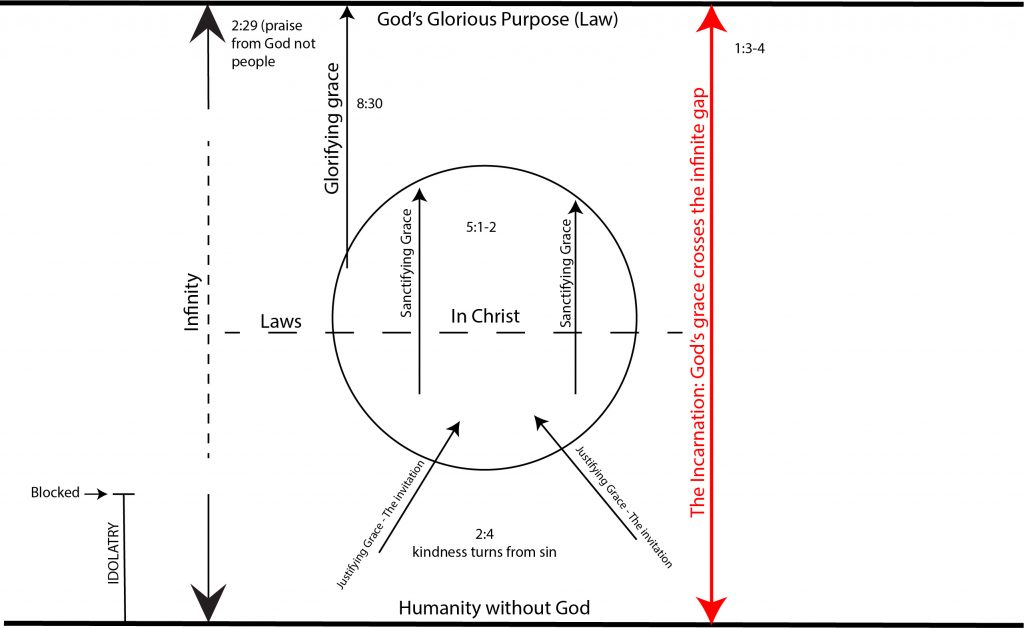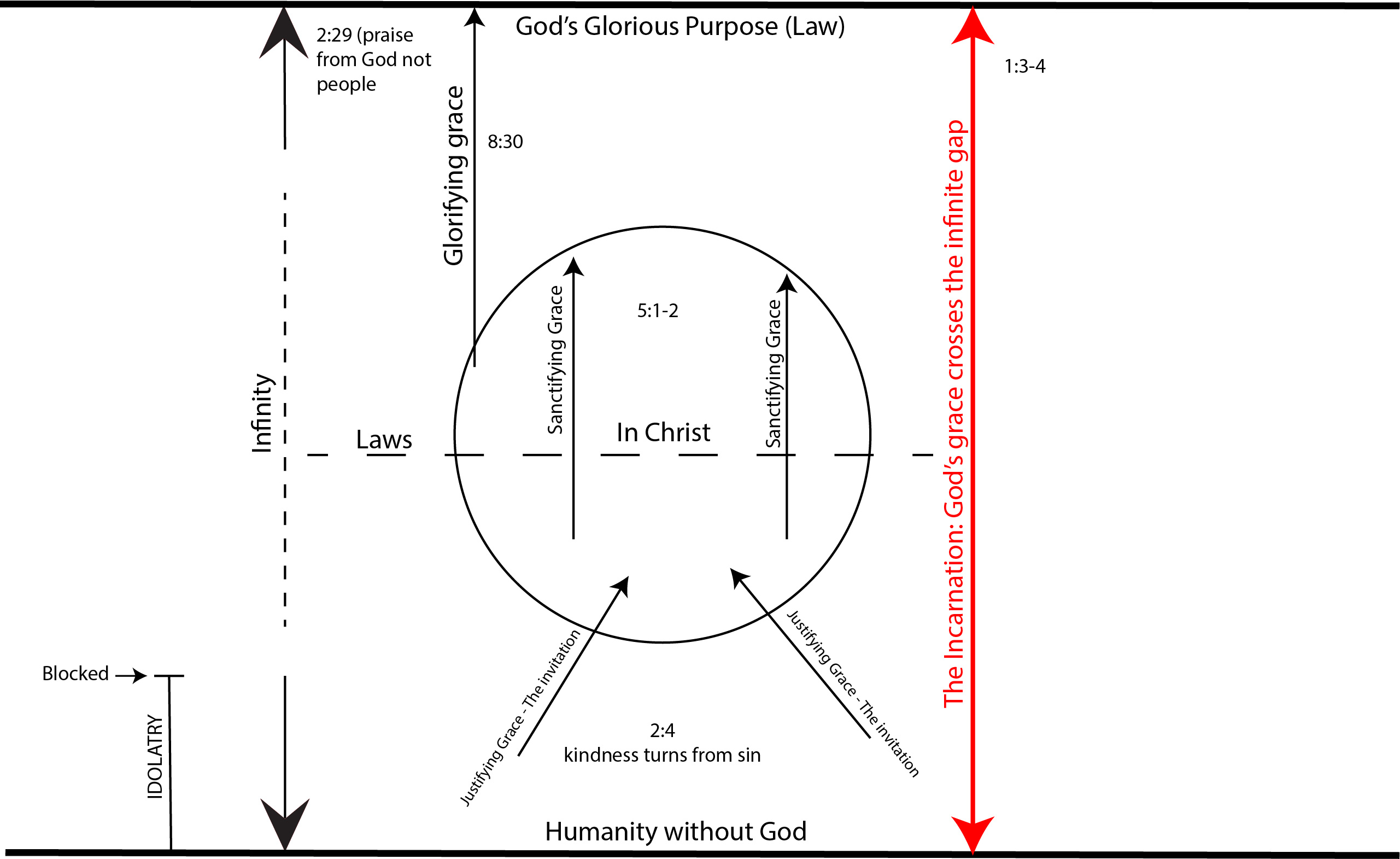What Do I Do About Grace?
This question has come up a number of times in my Romans study group, and it’s a good one. I’m not one to call all questions good. In fact, I think if you ask the wrong question, you often end up with an answer that leads you astray.
In this case, however, we’ve gone from Romans 1 through 11, and we’ve been learning about God’s faithfulness and God’s grace. One class member commented that the answer to any question I ever asked should be “God’s grace is sufficient.” That’s not a bad answer. Sometimes, however, we need to go a bit further.
Paul’s going to do just that starting with Romans 12. Now some people write, teach, and preach as though Paul talks about theology and then makes a break with his theology in order to talk about action or ethics. I disagree. Paul makes clear in Romans 12 that he is building on what he has said before, and what he says is very well founded. We should read his “therefore” in 12:1 as tying this together.
Because God is faithful, because God has given us his grace, here is the result.
Using the Word “Law”
One of the critical elements in understanding Romans, which leads up to this point, is Paul’s usage of the word “law.” When I was in my late teens a person I respected greatly told me that the big mistake in reading Romans and Galatians was misunderstanding “law.” This person told me to understand it as “Torah,” i.e., the practice of Judaism. The issue of the law here was one of whether gentiles needed first to be Jews.
This is doubtless one of Paul’s points, but it is far from Paul’s whole point. That definition works better in much of Galatians, where requiring gentiles to practice Judaism, with the entry point of circumcision, is much more central. In Romans, Paul uses “law” in some different senses.
Our tendency here is to try to find out which one sense Paul is using and then apply it throughout, but this may not be the best approach. “Law” can have quite a sizable semantic range, including God’s divine law and purpose for all time, specific bodies of law, such as the Torah as a whole, or the instructions to Noah, or even specific commands. English usage of Law doesn’t quite extend to a body of broad instruction, but that is part of the range of Paul’s usage.
A Diagram
Here’s a diagram I provided to my class. I’m going to write a few notes about it. Obviously, this is abbreviated. We have spent months getting to this point with my Romans class.

I started to put all the notes and the text on the diagram, but that proved a bit too complex and confusing. So herewith a few notes.
God has made no plan ever that was not intended to produce a holy people. God has a glorious purpose for us, and reaching that purpose perfectly is the ultimate goal. We have, however, all fallen well short of that, and we continue to fall short. But God’s grace is sufficient.
There should be no balance between faith and works or grace and works, because these are different things and cannot be balanced. There is no amount of works that I can do that will force God’s hand or earn God’s favor. I like to use navigation by the pole star. Think of yourself orienting your journey by sighting Polaris. You do not believe you’re going to get to Polaris by walking in that direction, but you do believe that you’ll get to another destination. The fact that you cannot reach it doesn’t make it less of a guide for what you can reach. (You can find my calculations on the north star here, along with much other verbage!)
The key here is the invitation of grace, the invitation to be “in Christ,” in which we allow God to work on us and change us, but we cease judging ourselves or others according to the ultimate perfection of a goal we cannot possibly attain.
Idolatry
The short line at the bottom left deals with idolatry. The true problem with idolatry is that it places something less than God in the place of God. That can be our own desire to attain, to be in control. We like to be in control. We feel safer if we can say that God will take us to heaven because we have completed a list of chores. But that’s placing something less than God in God’s place.
Similarly, we can place something less than God’s perfect law in the place of God’s law. (My friend Pat Badstibner has written about this in The Law Is Not Soggy Corn Flakes.) I use Paul Tillich’s terminology to some extent, that idolatry is making something not ultimate your ultimate concern. So we have those who decide that this perfection thing being unattainable, we need to find something attainable and do that.
Doing the attainable with God (see Philippians 2:12-13 and John 15:1-8) is just fine. God knows where he can take you, and through sanctifying grace will guide you there. (Here’s where I depart from Wesley’s plan. I don’t believe in Christian perfection. I believe that is only accomplished with glorification. It should be made clear, however, that the perfection Wesley spoke about was not the attainment of all of God’s glorious purpose for us either.)
We start to step into idolatry when we start to trim God’s standards so that they look better to us. By this, again, I don’t mean looking at attainable goals. In fact, that is precisely what God has done with us. I show this in my diagram by the lines representing God’s commands and laws for times and circumstances.
God’s goal is always the same, but God works this out in many different ways in various times and places.
God’s Grace Is the Context
On the right I put the long red line that represents God’s grace. That is the one and only thing that connects us to an infinite God. Only God can cross that gap.
Let me apply this now to the particular question that came up in class multiple times. What do we do about sin in our midst? Do we forgive, excuse, confront, ignore?
And here is where we need to watch out. Matthew 7:1 is, I think, one of the most misunderstood and simultaneously disobeyed passages of scripture. It’s an important command. We also have Matthew 7:15ff regarding watching out for false prophets and knowing them by their fruit. Is this latter not an act of judgment?
I would say that we have to regularly inspect fruit and make decisions based on that. We might have to choose between one person and another to lead the children’s ministry. We might have to decide whether a pastor or teacher is acting as a false prophet. Those would be acts of judgment in one sense.
Guidance
The guidance I see in my chart is simply this: We also judge and inspect fruit in the light of the law and the laws.
First, we understand ourselves to be the objects of infinite grace. We are, ourselves, sinners, in need of God’s grace and action. I realize many find this hard to accept, but I see it in the context of broader reality. I am so pitiful that without God’s creative power I would not exist at all. Thus saying I need God in order to do good is a minor derivative. From that flows the idea that all depends on God.
Second, as recipients of God’s grace, we know that God is working in us and through us and that we are witnesses to the working of God’s grace. I often tell Christian audiences that there’s no question whether you will witness. The question is whether you will be a good witness or a bad one.
Thus we conduct all our fruit inspection in the context of the knowledge that we are recipients of God’s infinite grace, and not as superior people looking down upon lesser mortals. That position is left to God.
So how does that help one decide whether to confront or remain quiet?
Simply this: It sets the context. What is right becomes the question of what is the right thing to do as a recipient of God’s grace. Proverbs 26:4-5 provides a similar issue. Read it and then ask yourself the question. If I find a fool speaking, which should I do? Listen to the Holy Spirit and decide in the context of grace.
All to God’s Glory
As Paul says in 1 Corinthians 10:31, “Whether you eat or drink or whatever you do, do all things to God’s glory.” So ask, “Am I doing this for God’s glory, or am I doing it to justify myself or even glorify myself?” and “Is this done as an act of grace, or an act of condemnation?”
